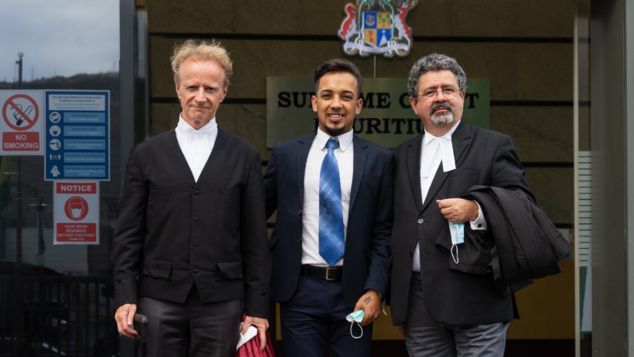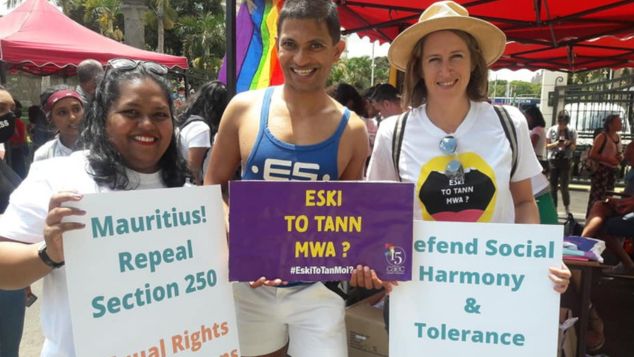
LGBTIQA+ rights activists have declared that a decision from Mauritius’ Supreme Court declaring a law that criminalised same-sex intimacy between men unconstitutional is a momentous victory for human rights.
London based human rights organisation Human Dignity Trust and their founder Tim Otty worked with lawyers from Herbert Smith Freehills and members of the local community including The Young Queer Alliance, Egides and Rekonekte, Collectif Arc-en-Ciel and other advocacy groups to being about the change.
The case heard by the court was brought by Abdool Ridwan (Ryan) Firaas Ah Seek with the support of the Human Dignity Trust, challenged the constitutionality of Section 250 of the Mauritian Criminal Code, which dated back to 1838. The provision criminalised ‘sodomy’ and anyone convicted could face a maximum penalty of five years’ imprisonment.
In the judgment, the Supreme Court judges underlined the constitutionally protected right to non-discrimination, stating, ‘…are there any valid reasons for the State to discriminate against the plaintiff having sexual intercourse in the only way available to him? The present case concerns the most private and intimate aspects of the identity of homosexual men, namely the manner in which they have sexual intercourse. Accordingly, there must exist particularly serious reasons for the State to justifiably interfere with the manner in which homosexual men choose to have consensual sexual intercourse in private.’
“This decision finally topples 185 years of state-sanctioned stigma against LGBT people in Mauritius and sends yet another important message to the remaining criminalising countries in Africa and beyond: these laws must go.” said Téa Braun, Chief Executive of the Human Dignity Trust.
The law was inherited from the British during the colonial period, in which the English criminal law was imposed upon Mauritius, and was retained upon independence in 1968, only shortly after the corresponding law was removed from the statute books in England in 1967.
In their reasoning the judges also overtly recognised the legacy of colonial-era laws, remarking that, ‘Section 250 was not introduced into Mauritius to reflect any Mauritian values but was inherited as part of our colonial history from Britain. Its enactment was not the expression of domestic democratic will but was a course imposed on Mauritius and other colonies by British rule.’
Abdool Ridwan (Ryan) Firaas Ah Seek, the plaintiff and current president of local LGBTIQA+ organisation Collectif Arc-en-Ciel welcomed the judgement.
“Receiving this judgment in my favour is an enormous relief. From today, as a citizen and a human being, I am now free to love whoever I want to without fear. Above all, it also means that the next generations can fully and freely embrace their sexuality without fear of being arrested. This victory is undoubtedly a major step towards the full inclusion of our community in Mauritian society,” he said.
“I wish to express my thanks to my legal team and am also immensely grateful to the Collectif Arc-en-Ciel and the Human Dignity Trust for their support over the past four years. This is truly a collective victory.”
The case was originally filed at the Supreme Court in 2019.
“This victory brings the number of jurisdictions that still criminalise LGBT people to 65. Mauritius now joins other African nations such as South Africa, Botswana, Seychelles, Angola and Mozambique in eradicating similar colonial-era criminalising provisions from their lawbooks,” added Téa Braun.

Pliny Soocoormanee, Executive Officer at the Peter Tatchell Foundation and gay Mauritian, said he was ‘overjoyed’ at the decision.
“I am overjoyed that after 185 years of LGBTs being criminalised in Mauritius, this homophobic law has finally come to an end. We were never asking for special treatment – just equality and respect. Mauritius may be small but the message this sends to the world is huge. Criminalisation in every country belongs in the past. As a gay Mauritian, this day will live with me forever.”
United Nations welcomes landmark decision
The United Nations in Mauritius—which includes UNAIDS, UNFPA, OHCHR, UNDP and WHO also welcomed the legal change.
“The Supreme Court today overturned an obsolete colonial law and demonstrated its commitment to non-discrimination and leaving no-one behind,” said Lisa Singh, United Nations Resident Coordinator in Mauritius. “The UN in Mauritius and internationally welcomes the decision of Mauritius to join the growing list of African countries protecting the human rights of everyone, including LGBTQI+ people.”
Anne Githuku-Shongwe, Director of UNAIDS’ Regional Support Team for Eastern and Southern Africa also applauded the ruling.
“Mauritius’ decision to decriminalise homosexuality is an important step forward for public health and a step towards equal rights, respect and dignity for the LGBTQI community,” Githuku-Shongwe said. “UNAIDS applauds Mauritius for today’s decision which will mean that men who have sex with men will have much easier access to the health and social services they need without fear of arrest or criminalization. Work will need to continue to break down the barriers of stigma and discrimination towards the LGBTQI community, but today’s ruling is a positive step in the right direction. It will save lives.”
OIP Staff, top image: Tim Otty, Abdool Ridwan Firaas Ah Seek and Gavin Glover (Human Dignity Trust)
You can support our work by subscribing to our Patreon
or contributing to our GoFundMe campaign.





